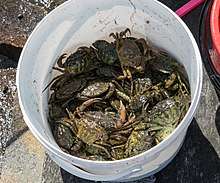Crab mentality
Crab mentality, also known as crab theory or crabs in a bucket (also barrel, basket, or pot) mentality, is a way of thinking best described by the phrase "if I can't have it, neither can you".[1] The metaphor is derived from a pattern of behavior noted in crabs when they are trapped in a bucket. While any one crab could easily escape,[2] its efforts will be undermined by others, ensuring the group's collective demise.[3][4]

The analogy in human behavior is claimed to be that members of a group will attempt to reduce the self-confidence of any member who achieves success beyond the others, out of envy, resentment, spite, conspiracy, or competitive feelings, to halt their progress.[5][6][7][8]
Impact on performance
Crab mentality affects performance in an organization as humans behave in similar manner as the crabs particularly within social teams.[9] The impact of crab mentality on performance was quantified by a New Zealand study in 2015 which demonstrated up to an 18% average exam result improvement for students when their grades were reported in a way that prevented others from knowing their position in published rankings.[10]
Deaf Community
In the Deaf Community, discussion of within-group prejudice is often met with references to the “crab theory”, which holds a prominent role in Deaf cultural folklore. Sometimes referred to Crabs in a Barrel Syndrome, “crab theory” is a conceptual metaphor used to illustrate the “mentality and behaviors of individuals belonging to or identifying with a particular community or culture, who ‘hold each other back’ from various opportunities for advancement and achievement despite incentives and expectations for collaboration” (Miller, 2017, pg. 1). Although the origins of the crab theory are not clear, it is sometimes attributed to Philippino journalist and feminist activist, Ninotchka Rosca. According to the crab theory, some Deaf individuals may act prejudicially against other Deaf individuals who attempt to become successful (DeLora, 1996; Moore & Levitan, 1993; Murphy, 1949). The analogy is to a bucket of crabs: When one crab successfully pulls itself to the top of the bucket, the others will pull it back down. Moore and Levitan (1993) attribute this to a conformist mentality that developed out of oppression.
The first systematic research investigation of Crab Mentality in the Deaf Community was in a doctoral dissertation by Dr. Frank P. Adams (Department of Psychology, Gallaudet University) entitled "Does the Crab Theory Hold Water? Investigating Intragroup Discriminatory Attitudes in the Deaf Community" [11].
See also
References
- L. Douglas Wilder (October 1, 2015). Son of Virginia: A Life in America's Political Arena. Lyons Press. p. 185. ISBN 978-1-4930-1952-6.
- Low Robin Boon Peng (2016). Good Intentions Are Not Enough: Why We Fail At Helping Others. World Scientific. p. 104. ISBN 978-981-320-059-3.
- Sudipta Sarangi (April 1, 2013). "Capturing Indian 'Crab' Behaviour". The Hindu. Retrieved December 1, 2015.
- Miller, Carliss D. (January 2015). "A Phenomenological Analysis of the Crabs in the Barrel Syndrome". Academy of Management Proceedings. Academy of Management. 2015: 13710. doi:10.5465/AMBPP.2015.13710abstract.
- Manuel B. Dy (March 3, 1994). Values in Philippine Culture and Education. Council for Research in Values and Philosophy. p. 40. ISBN 978-1-56518-041-3.
- Herbert A. Leibowitz (December 31, 1994). Parnassus: Twenty Years of Poetry in Review. University of Michigan Press. p. 262. ISBN 978-0-472-06577-6.
- Albert Shanker (June 19, 1994). "Where We Stand: The Crab Bucket Syndrome". The New York Times. Retrieved December 1, 2015.
- David, E. J. R. (2013). Brown Skin, White Minds: Filipino / American Postcolonial Psychology. Charlotte, NC: Information Age Publishing. p. 119. ISBN 978-1-62396-209-8.
- Dietrich, David M.; Kenworthy, Michael; Cudney, Elizabeth A. (2019). Additive Manufacturing Change Management: Best Practices. Boca Raton, FL: CRC Press. p. 44. ISBN 978-0-367-15207-9.
- Spacey, Simon (2015). "Crab Mentality, Cyberbullying and "Name and Shame" Rankings". Waikato University, New Zealand. Retrieved April 19, 2015. Cite journal requires
|journal=(help) - Adams, F. "Does the Crab Theory Hold Water? Investigating Intragroup Discriminatory Attitudes in the Deaf Community" http://frankpadams.com/upload/97152/documents/4F2720A3AF8D3329.pdf